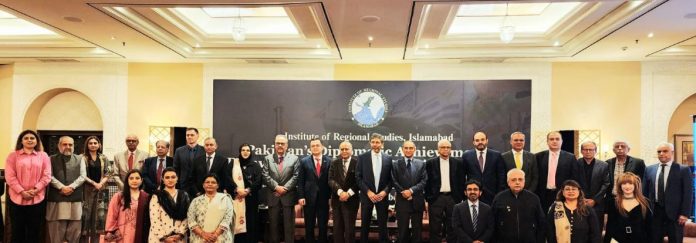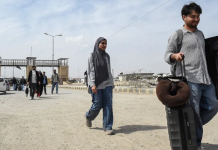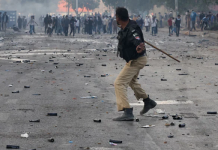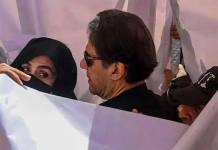ISLAMABAD, NOV 3 /DNA/ – The Institute of Regional Studies (IRS), Islamabad, hosted a high-profile seminar titled “Pakistan’s Diplomatic Achievements: Reinvigorating Foreign Relations through Renewed Global Engagement.”
In his inaugural address, Federal Minister for Defence Khawaja Muhammad Asif lauded Pakistan’s diplomatic resurgence, calling it a transformative shift from reactive diplomacy to proactive global engagement.
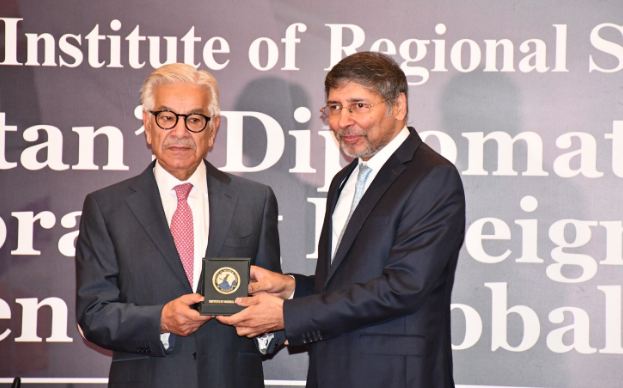
He stated that Pakistan has re-emerged as a credible and confident voice in international affairs “forging alliances, not dependencies.” The Minister underscored the government’s focus on economic diplomacy, noting that strengthened ties with Saudi Arabia, China, the UAE, and the United States have attracted multi-billion-dollar investments in energy, minerals, infrastructure, and technology. He commended Pakistan’s diplomatic corps for restoring the nation’s image as a stable, dependable, and forward-looking state.
Federal Minister for Information and Broadcasting, Mr. Attaullah Tarar (N.I.) praised the professionalism of Pakistan’s diplomatic apparatus in highlighting the country’s strategic importance in regional affairs. He stressed that Pakistan has been a victim, not a sponsor, of terrorism as alleged over the years, underscoring the government’s commitment to justice and transparency. Commending the unity of the nation, the armed forces’ valor, and the media’s responsible role, he said Pakistan’s high-level engagements from Riyadh to Beijing and from Doha to Washington reflect renewed confidence and strategic clarity. He emphasized that Pakistan is “no longer an observer but an architect” in shaping regional security and economic cooperation across the globe.
In his welcome address, Ambassador Jauhar Saleem, President IRS highlighted Pakistan’s reinvigorated diplomatic posture marked by successful high-level visits and renewed partnerships with key global and regional powers. He noted, “From Riyadh to Baku, from Beijing to Washington, Pakistan’s handshake today spans continents. Our diplomacy is forward-looking, economically grounded, and strategically balanced.” Ambassador Saleem commended Pakistan’s foreign service for their dedication, and highlighted the vital role of diplomacy in securing economic, energy, and defence partnerships. He underlined that Pakistan still faced a number of challenges externally and internally and only a stable, secure and economically resilient Pakistan can support a global engagement befitting a nation of 250 million people. He expressed hope that the seminar would generate insightful recommendations to help sustain the country’s reinvigorated foreign policy that could project a confident and forward looking Pakistan abroad.
Former Minister for Energy, Commerce, and Foreign Affairs, Khurram Dastgir Khan, delivered the keynote address underscored that courage is the virtue enabling all others and commended the leadership for making bold decisions during challenging times. Mr. Khan also praised Pakistan’s enduring partnership with China and acknowledged the role of the armed forces and political leadership in effectively demonstrating the resilience of China’s defense infrastructure during the May 6th episode, as well as safeguarding Pakistan’s nuclear deterrent. He concluded by stressing the need to skillfully navigate the geo-economic landscape to achieve national strength through economic revival and investment.
Ambassador Aizaz Ahmad Chaudhry, Former Foreign Secretary, observed that Pakistan’s diplomatic outreach reflects a process of geo-economic consolidation, emphasizing the need for institutional coordination to sustain recent diplomatic gains. He reiterated that Pakistan intends to remain a peacemaker in the region; however, this optimism is conditional and should not be mistaken for complacency, as demonstrated by Pakistan’s firm response to the May 6th misadventure. He commended both the political and military leadership for making difficult yet necessary decisions, and also acknowledged the United States for its renewed interest in maintaining positive relations with Pakistan.
Ambassador Asif Ali Durrani, Former Special Representative for Afghanistan Affairs, noted that Pakistan’s role as a regional stabilizer continues to strengthen through key connectivity projects. He emphasized that while Pakistan’s diplomatic efforts merit appreciation, geographical challenges persist in the form of complex relations with Afghanistan, Iran, and India. Ambassador Durrani underscored the need to reinforce the rule of law, cautioning against its erosion. He called for a coordinated and reassessed approach to the repatriation of Afghan nationals, ensuring political ownership and institutional alignment. He further stressed that effective policing requires empowering local law enforcement agencies as the first line of defense to deal with pressing security challenges.
Ambassador Dr. Raza Muhammad, Former President IPRI, noted that for the first time, foreign policy, defence exports, and economic outreach are aligned, citing major projects such as Reko Diq, ML-1 rail, and manpower-export agreements. Mr. Zahid Hussain, senior journalist and author, emphasized that sustained domestic stability and transparency are vital for consolidating diplomatic success.
Syed Hassan Akbar, Chairman of the Strategic Policy Planning Cell, NSD, highlighted that Pakistan is evolving into a policy-shaping nation, integrating technology, digital economy, and climate diplomacy into its foreign policy framework.

